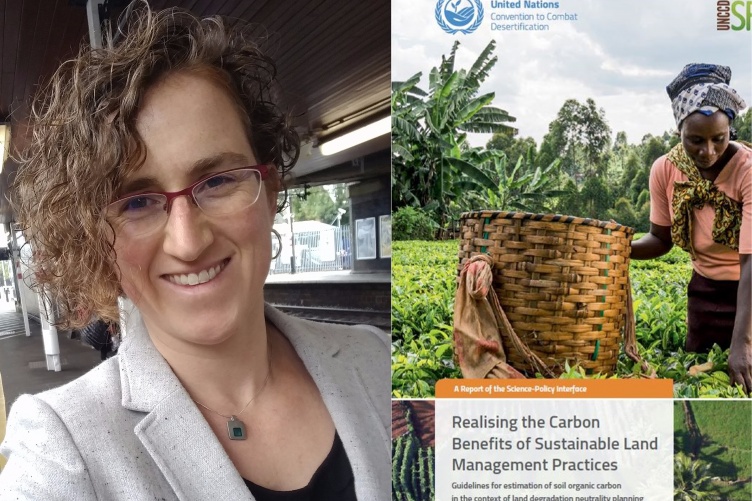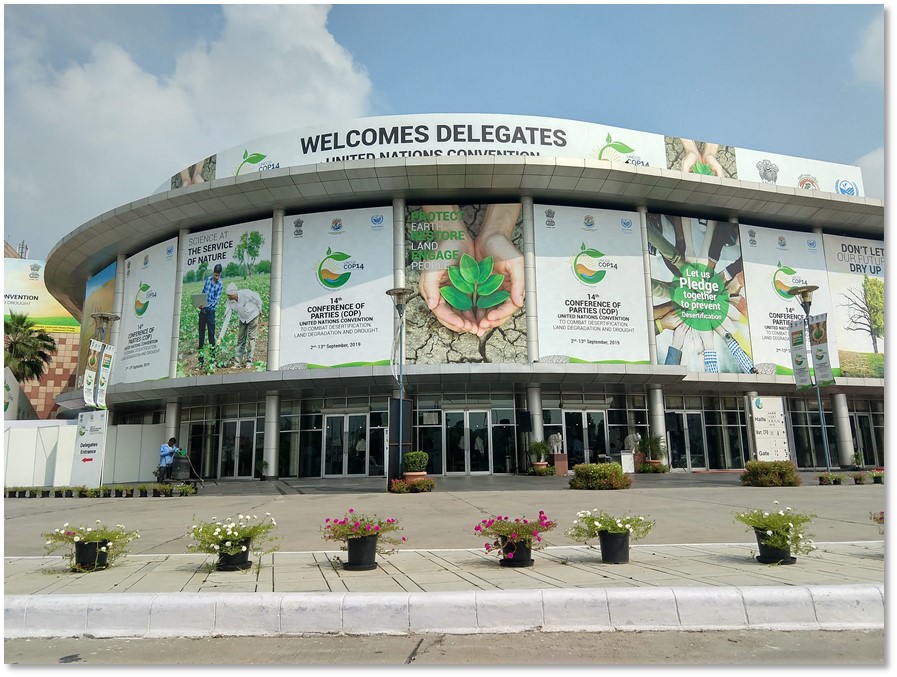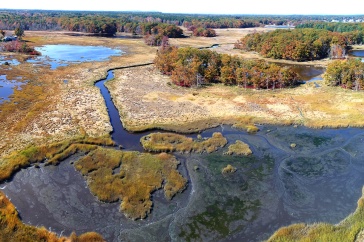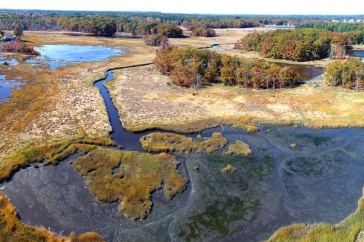
UNH research scientist Nell Campbell recently co-authored a report for the United Nations Convention to Combat Desertification.
Countries around the world have pledged to adopt new measures that will improve their land and soil health — which has implications for climate change policy — thanks in part to a scientist from the University of New Hampshire.
“We are losing healthy lands faster than we are able to bring them back or offset their losses,” says Nell Campbell, a research scientist with the UNH Earth Systems Research Center. Campbell’s expertise in agroecosystems and soil biogeochemistry was recently called upon to address this global challenge.
The United Nations has identified desertification, and the larger issue of land degradation, as a challenge that can be lessened and prevented through coordinated, worldwide efforts. To this end, Campbell has co-authored a report titled “Realising the Carbon Benefits of Sustainable Land Management Practices” for the United Nations Convention to Combat Desertification (UNCCD) that provides guidance for countries to make better land-use decisions and preserve soil health, which ties into climate change.
“We are losing healthy lands faster than we are able to bring them back or offset their losses.”
“Soils are one of the largest stores of carbon on Earth,” Campbell says. When land is not managed properly, that carbon is released into the atmosphere, which then contributes to climate change, she explains.
Desertification — the process where land in dry areas declines in productivity to the point of becoming barren — is mostly caused by a concurrence of poor land uses and climate effects. For instance, where severe and repeated drought occurs in areas affected by overgrazing, deforestation, wildfires, and other agricultural practices, the soil is unnecessarily exposed and becomes vulnerable to carbon losses to the atmosphere.
The UNCCD was formed about a quarter century ago to tackle desertification and is committed to supporting all interested countries in their efforts to achieve land degradation neutrality by the year 2030. In practical terms, neutrality means that any loss of soil carbon must be somehow replaced so that each country’s net loss is zero. The purpose is to ensure that the amount of productive land available globally remains stable into the future.
How degradation is measured and how neutrality can be achieved was debated for a while, prompting UNCCD to examine closely what could be done about it. Campbell took a temporary leave of absence from UNH to work as a consultant for the UNCCD earlier this year, and during that time, she produced the report that delves deeper into these topics.
The UNCCD focuses on three basic metrics of land degradation, she says: land cover change, net primary productivity (or how much plant biomass is growing) and soil carbon. Scientists can assess land cover change and plant biomass from satellite data, but soil carbon is much more difficult to quantify, so difficult, in fact, that many regions simply don’t have those data.
“This task was enormous,” Cambell says. “It was by far the hardest thing I’ve ever done.”

Despite the challenge, she and co-contributor Paul Vlek (a retired director of the Center for Development Research at the University of Bonn, Germany) gathered all the accessible data and researched the types of computer software or models that would work best with these data to help countries to use sustainable land management to benefit their soils.
The result is options for decision-makers to select sustainable land use practices and monitor soil carbon to help each country achieve land degradation neutrality.
“I’m intrigued by the possibility that technology can connect organizations with a global mandate like the UNCCD to groups and individuals who want to improve the health of their soils, but to be successful, it needs to be done in a way that it hasn’t been done before,” she explains.
This autumn, after the report was released, Campbell traveled to a city close to New Delhi, India, to take part in the UNCCD Conference of Parties. There, she found herself on a global stage in a discussion on how best to preserve soil health with representatives from countries from all regions of the world. The discussion was based on the report she co-authored as well as additional policy proposals developed by the UNCCD’s Science Policy Interface team.
The Parties – meaning those legally bound – to the UNCCD are 196 countries and the European Union. However, only 122 countries among them have expressed interest in achieving land degradation neutrality. Still, country parties negotiated and accepted most of the policy proposals and can now move forward towards the 2030 land degradation neutrality deadline to make better use of sustainable land management to benefit soils.
Fresh off this meeting, Campbell says she felt there was an overarching sense of urgency among the country parties to deal with land degradation in a more cohesive manner moving forward.
“We have some amazing global resources, we just need to align them better and make them more harmonized,” she adds.
The Institute for the Study of Earth, Oceans, and Space (EOS) is UNH’s largest research enterprise, comprising six centers with a focus on interdisciplinary, high-impact research on Earth and climate systems, space science, the marine environment, seafloor mapping, and environmental acoustics. With more than $43 million in external funding secured annually, EOS fosters an intellectual and scientific environment that advances visionary scholarship and leadership in world-class research and graduate education.
-
Written By:
Rebecca Irelan | Institute for the Study of Earth, Oceans, and Space | rebecca.irelan@unh.edu | 603-862-0990
















































